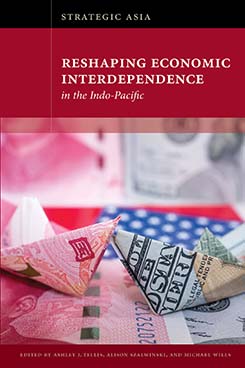Interdependence Imperiled? Economic Decoupling in an Era of Strategic Competition
This chapter from Strategic Asia: Reshaping Economic Interdependence in the Indo-Pacific assesses changes to the international economic landscape fueled by China’s rise and examines how the U.S. is navigating this challenge.
EXECUTIVE SUMMARY
MAIN ARGUMENT
The intensification of globalization in the post–Cold War era has contributed to deep economic integration with China. China’s entry into the World Trade Organization made it a linchpin of global trade, and its impressive ensuing growth has enabled it to challenge U.S. hegemony. The rising rivalry with Beijing in recent years has driven Washington to pursue trade diversification, expand domestic manufacturing, and lessen dependency on China. While the Trump administration inchoately sought to decouple from China, the Biden administration has emphasized “de-risking” to protect critical supply chains while vigorously competing with China through various restrictive trade and industrial policies. Driven by this competition and their own problems with Beijing, key Indo-Pacific states are also struggling to diversify from China without cutting off any of the existing linkages that provide them with significant economic and strategic benefits.
POLICY IMPLICATIONS
- Large-scale economic decoupling from China is unlikely for the U.S. and Indo-Pacific nations given the importance of the absolute gains from trade. Consequently, narrow trade diversification may be the only outcome within reach.
- U.S.-China competition threatens globalization, even as China’s diminishing trade linkages with the U.S. potentially increase its own strategic autonomy.
- Although U.S. de-risking might limit the dangers posed by Beijing to critical supply chains, China’s strong trade ties with U.S. partners and others will advance both its domestic and strategic ambitions, thus undermining U.S. efforts to limit China’s rising power.
Ashley J. Tellis is the Tata Chair for Strategic Affairs and a Senior Fellow at the Carnegie Endowment for International Peace. He is also Research Director of the Strategic Asia Program at the National Bureau of Asian Research.
Strategic Asia
The Strategic Asia annual edited volume incorporates assessments of economic, political, and military trends and focuses on the strategies that drive policy in the region. Learn more about Strategic Asia.



